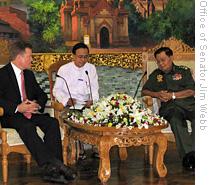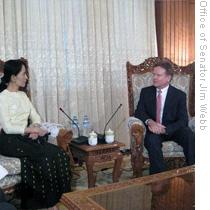Bangkok
17 August 2009
 |
| US Senator Jim Webb's meeting with Burma's Chairman of the State Peace and Development Council Senior Gen. Than Shwe, in Naypyidaw, 15 Aug 2009 |
Senator Jim Webb says he did not directly raise the issue of whether Burma has a covert nuclear program during talks with the country's leader, General Than Shwe. Webb met with the reclusive leader on Saturday, the first high-ranking U.S. official to do so.
However, he said Monday that the Burmese government denied having a nuclear program.
"But it was communicated to me earlier on that there was no truth to that, from a very high level in their government," Webb said.
Earlier this month, Australian researchers said interviews with defectors from Burma revealed that the government has a secret nuclear program, allegedly aided by North Korea. In June, a North Korean ship believed to be headed to Burma with a suspicious cargo turned back under international pressure. U.S. Secretary of State Hillary Clinton warned that any military ties between Burma and North Korea pose a security threat to the region.
 |
| US Senator Jim Webb's meeting with Burmese opposition leader Aung San Suu Kyi in Rangoon, 15 Aug 2009 |
Webb says it appears Aung San Suu Kyi might not oppose easing sanctions on Burma. The U.S, the European Union and other Western governments have imposed economic sanctions over the years to punish the repressive military government. Webb favors the eventual lifting of sanctions on Burma, which he and others argue only increased the isolation of its people.
"I don't want to take the risk of misrepresenting her views," Webb said. "But I would say to you that it was my clear impression from her that she is not opposed to lifting some sanctions."
In the late 1990s, Aung San Suu Kyi expressed some support for economic sanctions as a way to pressure the government to recognize her party's election victory in 1990 and allow it to form a government. But in recent years, she has not publicly commented on sanctions. She has spent 14 of the last 20 years under house arrest.
On Sunday, Webb said Washington needs to develop new ways to end Burma's isolation and bring about political and economic change. Webb, a Democrat, spoke with Secretary Clinton Sunday and will brief her again upon his return to Washington.
The chairman of the Senate Foreign Relations subcommittee on East Asia and Pacific Affairs is on a five-nation tour of Southeast Asia. From Bangkok, he will fly to Cambodia Tuesday and from there, to Vietnam.